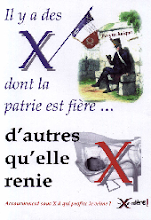 THE NEW STATESMAN
THE NEW STATESMANMarch 27, 2008
Babies of the Disappeared
Chris Bradley
Details of the fates of many children of Argentina's "disappeared" - adopted and given new identities by military families - are only now starting to emerge
As a child, María Eugenia Sampallo Barragán had a fiery relationship with her mother, who chose unusual ways of showing affection. Outbursts such as "If it wasn't for me you would have ended up in a ditch" and "Badly educated brat - only a child of a guerrilla could be so rebellious" were common, but would not be fully understood until years later.
The truth was finally revealed in 2001 and María Eugenia, 30, is now demanding 25-year jail sentences for the couple who raised her, Osvaldo Rivas and María Cristina Gómez Pinto, and their associate Enrique José Berthier. The trio are accused of removing her from her parents, falsifying her birth certificate and erasing her true identity. The verdict is due in a Buenos Aires court on 4 April.
María Eugenia was five when a family friend told her she had been adopted after her real parents died in a car crash. Strange, then, that Rivas and Gómez were listed as her biological parents on her birth certificate. Other versions of her origins soon emerged: that she was the daughter of a maid who had given her up for financial reasons; that she was the daughter of an air hostess from Europe, who came to Argentina and became pregnant through an extramarital affair.
In 2001 María Eugenia became the 72nd grandchild recovered by the Grandmothers of Plaza de Mayo, a group that works to find the children of their children, who were tortured and killed under the military dictatorship of 1976-83. They calculate that among the 30,000 "disappeared", more than 400 were babies, either kidnapped along with their parents or born in captivity. Many were raised with new identities by the same military families that had had a hand in the fate of their biological parents.
Mirta Barragán was six months pregnant when she and her partner, Leonardo Sampallo, were kidnapped in 1977. There is no further record of either of them, but six months later their baby was delivered to Rivas and Gómez by Berthier, a friend in the military. With the help of a now-deceased doctor, a birth certificate was signed in their names.
María Eugenia has become the first child the grandmothers have found to seek justice against her appropriators. When she took the witness stand she could only answer "I don't know" when asked her place and date of birth. She also told the court that, when she left home after finishing school, "I didn't take any photos of my past, with them, as it was something I preferred not to remember."
Not all of the children had such unhappy upbringings. Many were sent to good schools and were treated with love and affection. Some couples claim not to have known the true origins of the babies they raised, and many of the recovered grandchildren choose to believe that, remaining close to both their biological families and their adoptive parents.
The right to an identity was enshrined in the International Convention on the Rights of the Child at the instigation of the Grandmothers, through what are known as the "Argentine clauses". However, as these children approach their thirties, most feel an instinctive bond with their adoptive parents and are reluctant to see them punished. Others prefer to keep a low profile and try to get on with their lives.
Not so María Eugenia. The Grandmothers hope that her case will encourage more to come forward, and that it will help speed up the process of justice for the children of their children.
Link to Article








No comments:
Post a Comment